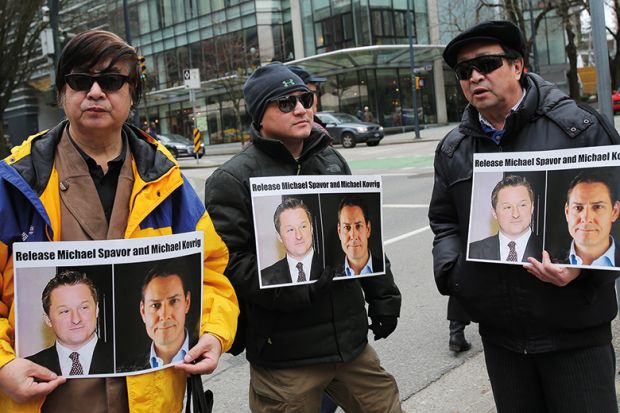Growing numbers of international academics are expressing reluctance to travel to China for field research or academic conferences, even if Covid-related border restrictions ease.
In Japan, the spotlight is on the case of Yuan Keqin, a Chinese national who was a history professor at the Hokkaido University of Education until his official retirement this March.
In May 2019, Professor Yuan was detained while travelling in China for a family funeral. He was incommunicado for nearly two years until he was indicted by the Chinese government. Last month, his son appealed for his 65-year-old father’s release.
Naomi Chi, an associate professor of public policy at Hokkaido University, told Times Higher Education that six Japan-based scholars had been detained in China since 2013. However, Professor Yuan is the only one who has not been released and he has been held the longest.
“The reasons for their detainment are vague, but mostly concerning national security,” she said. “Many scholars who conduct research on China or have relations with Chinese scholars or universities have mentioned that they are afraid of travelling to China even post-Covid.”
Shaun O’Dwyer, an Australian national and associate professor at Kyushu University researching modern Confucianism, told THE he turned down two invitations to attend conferences in China “out of personal concerns for security”.
“I would say that for academics in Japan, the chill definitely began with the arrests of Nobu Iwatani and Yuan Keqin in 2019,” he said, referring to another Japan-based professor who was detained but subsequently released.
China File, a publication of the US-based Asia Society, said last month that slightly more than half its contributors – mostly sinologists who are academics, writers and diplomats – felt unease about returning to the country.
Of 121 respondents to a questionnaire, 56 per cent said they would “probably not”, “definitely not” or were “unsure” about returning to China, where they had previously worked or conducted research. Many cited the detention of the “two Canadian Michaels”: Michael Kovrig and Michael Spavor.
Scott Kennedy, who was a founding director of Indiana University’s China office and is now a senior adviser at the Center for Strategic and International Studies, was a regular visitor to China from 1988 to 2019. He had “absolutely no idea” what he would do when the Chinese border reopens.
“The political situation has changed significantly in the past few years,” he told THE. “It’s a huge dilemma for people who genuinely care about China, good scholarship and the people we interact with.”
Margaret Lewis, a law professor at Seton Hall University, said she was “extremely doubtful, though still a bit uncertain, whether I would get on a plane for China even if given an unexpected green light to do so…I will not jeopardise my ability to be there for my kids.”
Thorsten Benner, director of the Global Public Policy Institute in Berlin, saw a change since he travelled to China in 2018. “This was and will remain my last trip to China for the foreseeable future,” he said.
POSTSCRIPT:
Print headline: Scholars jittery about China trips
Register to continue
Why register?
- Registration is free and only takes a moment
- Once registered, you can read 3 articles a month
- Sign up for our newsletter
Subscribe
Or subscribe for unlimited access to:
- Unlimited access to news, views, insights & reviews
- Digital editions
- Digital access to THE’s university and college rankings analysis
Already registered or a current subscriber? Login








